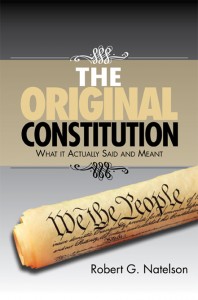One of the most enduring myths in American constitutional history is that Chief Justice John Marshall was a judicial activist whose decisions are good precedent for the modern federal monster state.
Marshall was the fourth chief justice of the U.S. Supreme Court (third, if you don’t count John Rutledge, a recess appointment who was never confirmed). He served from 1801 until 1835. In the popular literature, Marshall is usually presented as a judicial activist who adroitly used the law to further federal power and the views of his own Federalist Party.
Among other things, he is accused of:
* Inventing in the case of Marbury v. Madison (1803) the doctrine of judicial review – that laws contrary to the Constitution are void. He thereby, it is said, appropriated huge power the Founders did not want his court to have.
* In McCulloch v. Maryland (1819), turning the Necessary and Proper Clause into a vast reservoir of federal power.
* In Gibbons v. Ogden (1824), laying the foundation of the regulatory state by, in the words of Justice Robert Jackson, “describ[ing] the Federal commerce power with a breadth never yet exceeded.” (Wickard v. Filburn, 1942).
We’ll see in a minute why these charges are made. But Marshall was innocent of all of them.
First, a little background: Marshall was not merely important as Chief Justice. He was also a leading spokesman for the Constitution in the 1788 Virginia ratifying convention. So he well knew what the ratifiers did – and didn’t – understand the Constitution to mean. Also, while some writers seem to assume that Marshall made up law as he went along, if you actually study the jurisprudence of his time, you find that Marshall’s conclusions are almost always on target.
So what are the facts about each of the charges above?
* Marshall didn’t “invent” judicial review. It already was a well-accepted aspect of American law when Marshall announced the unanimous court decision in Marbury. Judicial review dated back to colonial times, when American laws in violation of Magna Carta or of the colonial charters (the “constitutions” of the colonies) were understood to be void. One distinguished researcher has found over 30 reported cases after Independence and before Marbury in which American courts applied, or recognized, the rule of judicial review. There also were repeated references to judicial review during the debates over the Constitution, with almost everyone favoring it. As for the charge of a power grab: In his 34 years on the court, Marbury was the only case in which Marshall struck down a federal law as unconstitutional.
* Marshall’s treatment of the Necessary and Proper Clause in McCulloch v. Maryland is widely misunderstood by people who (a) don’t know the law of the time, (b) haven’t read the entire opinion, and/or (c) don’t know that two of the words Marshall used – “convenient” and “appropriate” – had narrower meanings in his time than they have today. Marshall himself explained the decision in a subsequent series of op-eds, where he acknowledged that the Necessary and Proper Clause is not a grant of power at all, but an interpretive guide.
* Gibbons v. Odgen is often appealed to, as Justice Jackson did, for a very broad reading of the “commerce” component of the Necessary and Proper Clause. Under this reading, the Necessary and Proper Clause allows Congress to regulate any economic activity “substantially affecting” interstate commerce: agriculture, mining, manufacturing, heath care, insurance, medical marijuana – in fact, the entire economy.
However, Gibbons did not even mention the Necessary and Proper Clause. The primary holding of Gibbons was that navigation was within the prevailing legal definition of “commerce” for constitutional purposes – a decision that, under the original understanding of the Constitution, was clearly correct. Some of the Court’s dicta (extraneous language) added that in some circumstances commerce (including navigation) within state boundaries might be so tied up with interstate commerce that Congress could regulate it as well. But when Marshall addressed other aspects of the economy, it was to say that they were outside of Congress’s power. He specifically mentioned “health laws of every description” as being reserved exclusively to the states.
So those who use Gibbons to argue for the constitutionality of federal control of manufacturing, agriculture, land use, or health care are twisting some of Marshall’s words and omitting others.
Why is Marshall so often painted as a screaming activist?
There are two reasons:
1. Many have had personal reasons for painting Marshall that way. His political enemies, such as Thomas Jefferson, certainly did. In more modern times, the big-government types who dominate the law schools certainly do: They want to enlist Marshall to justify their own constitutional agendas.
2. Few people who make the claim about Marshall’s activism today actually have studied the law of Marshall’s time or have checked the contemporaneous meanings of the words he used. In fact, my guess is that many of them have never read an entire Marshall decision. Instead, they have read the skewed, chopped-up versions appearing in law school books, edited for content by liberal professors.
If you want to get a genuine feel for the kind of judge John Marshall was, read Federalism & Separation of Powers: “Health Laws of Every Description” John Marshall’s Ruling on a Federal Health Care Law, in which Dave Kopel and I use Marshall’s own words to show how Marshall would have ruled on the constitutionality of Obamacare.
- How the Founders Explained Limits on the Federal Government - January 21, 2026
- The Constitution and the Trump Tariffs - December 7, 2025
- Ancient Rome and the Constitution - October 29, 2025

